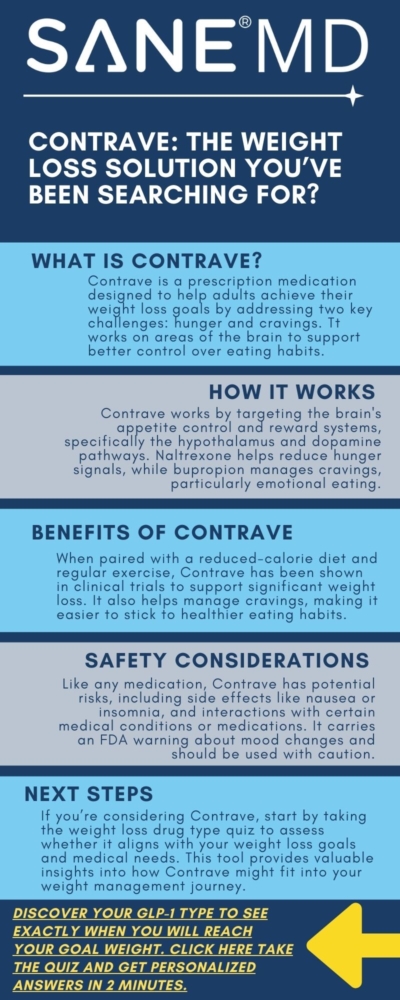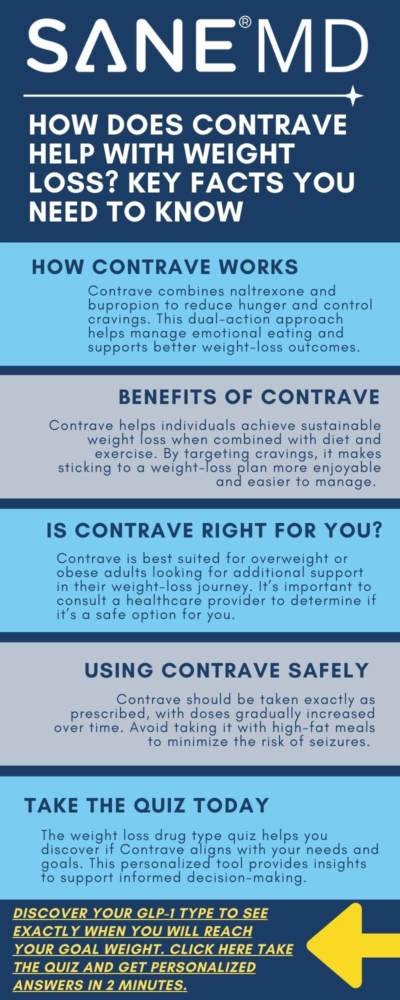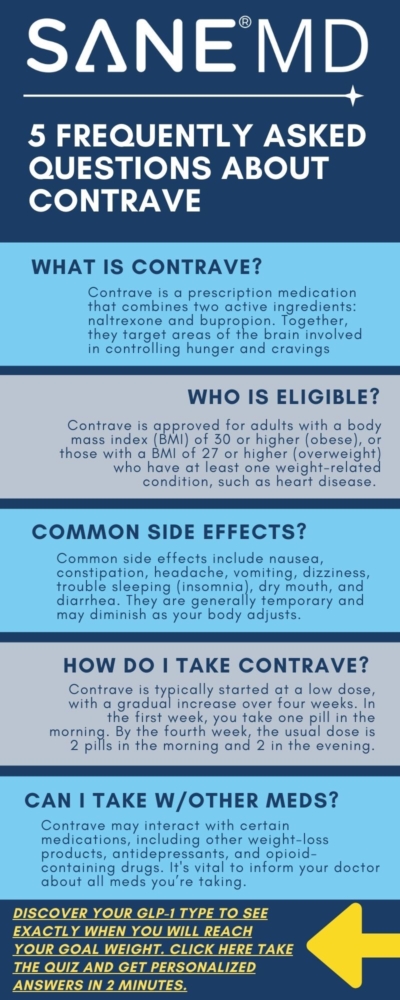Is Contrave the Best Weight loss Solution You’ve Been Searching For? Quiz Inside!
Is Contrave the best weight loss solution? Read on to find out!
Contrave is a prescription medication designed to aid in weight loss for adults who are overweight or obese. By combining two active ingredients, naltrexone and bupropion, known together as naltrexone bupropion, Contrave targets specific areas of the brain associated with hunger and cravings.
This dual-action approach makes it a potential option for those struggling to achieve their weight loss goals through diet and exercise alone.
The purpose of this article is to provide a comprehensive overview of Contrave, including its benefits, risks, and how it works. Whether you’re considering Contrave as part of your weight management plan or simply want to learn more, the information here will help you make an informed decision.
If you’re unsure whether Contrave is the right weight loss option for you, the weight loss drug type quiz is a helpful starting point. This tool can guide you in assessing if this medication aligns with your weight loss needs and overall health goals.
Key Takeaways
- Contrave combines naltrexone and bupropion to target hunger and cravings.
- It works best with a reduced-calorie diet and regular exercise for weight loss.
- Take the weight loss drug type quiz to explore if Contrave fits your weight management needs.
What is Contrave (Naltrexone Bupropion)?
Contrave is a prescription medication approved to help obese adults lose weight and manage their weight long-term. It combines two active ingredients, naltrexone and bupropion, which work together to address both hunger and cravings.
By targeting these challenges, Contrave may support individuals in sticking to a reduced-calorie diet and maintaining a consistent exercise routine, both critical components of successful weight management.
This medication is intended for overweight and obese adults with a body mass index (BMI) of 30 or higher or those with a BMI of 27 or higher who also have weight-related health conditions, such as high blood pressure or type 2 diabetes.
If you’re considering whether Contrave aligns with your weight loss needs, the weight loss drug type quiz is a helpful resource. It can assist in evaluating if this medication could be a part of your journey to a healthier weight.
Is Contrave the Best Weight Loss Solution? How Contrave Works
Contrave targets hunger and cravings by affecting specific areas of the brain involved in appetite and reward systems. The two active ingredients, naltrexone and bupropion, work synergistically to regulate signals related to food intake and pleasure. Bupropion is also approved to treat depression, highlighting its role in mental health treatment.
- Hypothalamus: This small but powerful gland in the brain plays a central role in appetite control. Contrave may influence the hypothalamus, potentially reducing hunger signals.
- Dopamine: Often called the “feel-good” neurotransmitter, dopamine is associated with pleasure and reward. By modulating dopamine levels, Contrave may help curb cravings, particularly those linked to emotional eating or habitual food rewards.
The precise way these ingredients lead to weight loss is not fully understood, but clinical studies suggest that they help reduce food intake and support better adherence to a healthy lifestyle.
Not sure if Contrave’s mechanism aligns with your weight management needs? The weight loss drug type quiz can guide you in understanding whether this medication suits your specific challenges and goals.
Weight Loss Benefits of Contrave
Contrave offers several potential benefits for individuals working toward their weight loss goals. Its unique combination of active ingredients has been studied in clinical trials, showing effectiveness in supporting meaningful weight loss when paired with a reduced-calorie diet and regular exercise.
Additionally, these studies have highlighted the impact of the treatment on various obesity-related risk factors, improving not only weight reduction but also metabolic and health metrics associated with obesity.
Here are some of the key benefits:
- Proven Efficacy: Clinical studies have demonstrated that Contrave can help overweight and obese individuals lose weight more effectively than lifestyle changes alone.
- Emotional Eating and Cravings: For those who struggle with emotional eating or food cravings, Contrave may help manage these challenges by targeting the brain’s reward and hunger centers.
Chronic Weight Management: When used alongside a healthy lifestyle, Contrave supports long-term weight management, helping individuals maintain their progress over time.
For more information on how Contrave can help you lose weight, read our comprehensive guide.
Interested in exploring whether Contrave could support your weight loss journey? Take the weight loss drug type quiz to see if Contrave is right for you!
Who is Contrave For?
Contrave is designed for adults who face challenges with weight loss due to hunger, cravings, or difficulty adhering to a healthy lifestyle. Overweight and obese patients have been included in clinical trials, such as the COR-Diabetes trial, to assess the efficacy and safety of naltrexone/bupropion for weight loss.
It may be prescribed for individuals meeting specific criteria:
- Body Mass Index (BMI): Contrave is intended for those with a BMI of 30 or higher (classified as obese) or a BMI of 27 or higher (classified as overweight) with weight-related conditions such as high blood pressure, type 2 diabetes, or high cholesterol.
- Previous Weight Loss Attempts: Individuals who have tried other weight loss methods, such as diet, exercise, or other interventions, without long-term success may find Contrave a helpful addition to their plan.
- Commitment to a Healthy Lifestyle: Contrave works best when paired with a reduced-calorie diet and consistent physical activity.
Still unsure if Contrave is suitable for you? The weight loss drug type quiz can help guide you in determining your eligibility and whether this medication aligns with your weight loss goals.
Safety and Precautions
As with any prescription medication, Contrave comes with certain safety considerations and precautions. It’s essential to understand these before starting treatment to ensure the medication is suitable for you.
FDA Warning
Contrave carries a warning about the potential risk of suicidal thoughts and behaviors, particularly in children, teenagers, and young adults. While this risk is rare, it’s critical to monitor mood changes or unusual behavior when starting the medication.
Precautions
Certain medical conditions or medications may contraindicate the use of Contrave. These include but are not limited to:
- Uncontrolled high blood pressure
- Seizure disorders
- History of eating disorders
- Physical dependence on opioids or alcohol
- Current use of certain antidepressants or medications that interact with bupropion or naltrexone
- Allergic reaction: While rare, allergic reactions can occur. Seek immediate medical help if you experience severe symptoms.
- Bipolar disorder: Contrave may increase the risk of manic episodes in individuals with bipolar disorder. Consult your healthcare provider if you have this condition.
- Serious allergic reaction: Recognize symptoms of a serious allergic reaction and stop taking the medication immediately if they occur. Seek medical help right away.
Monitoring
Regular check-ins with your doctor are important for tracking blood pressure, weight loss progress, and any potential side effects. For a deeper understanding, read our guide on Contrave side effects and safety considerations.
Always consult with your healthcare provider before starting Contrave to ensure it is safe and appropriate for your health profile. If you’re uncertain about whether this medication suits you, taking the weight loss drug type quiz here can provide valuable insights and guide your conversation with your doctor.
Taking Contrave with a Reduced Calorie Diet
For Contrave to deliver its intended weight loss benefits, it must be combined with a reduced-calorie diet and regular physical activity. This integrated approach not only enhances the effectiveness of the medication but also supports sustainable weight management and overall health.
- Dosage Instructions: Contrave is usually prescribed as two tablets in the morning and two in the evening. It’s essential to adhere strictly to your doctor’s dosage instructions and avoid exceeding the recommended amount, as this can increase the risk of side effects.
- Dietary Tips: To achieve optimal results, pair Contrave with a nutrient-dense, low-calorie diet. High-fat meals should be avoided while taking this medication, as they can increase the likelihood of adverse effects. Focus on incorporating legumes, lean proteins, fresh fruits, and vegetables into your meals to support your weight loss journey.
- Exercise Matters: Contrave is not a standalone solution for weight loss. Regular physical activity is crucial for maximizing results. Even moderate activities like walking, swimming, or light strength training can significantly improve overall health and enhance weight loss outcomes.
If you’re exploring whether Contrave aligns with your weight management goals, the weight loss drug type quiz is a practical tool. It helps set realistic expectations and assess if this medication is a good fit for your needs.
Dosage and Administration
Recommended dosage for weight loss and weight management
When starting Contrave, it’s crucial to follow a gradual dosage schedule to allow your body to adjust to the medication. For weight loss and weight management, the recommended dosage begins with one tablet taken by mouth in the morning for the first week.
At the start of the second week, an additional tablet is added in the evening. This incremental approach continues until the optimal dosing is reached at week four, with a total daily dose of 32 mg of naltrexone and 360 mg of bupropion.
Adhering to this schedule helps maximize the medication’s effectiveness in supporting your weight loss journey.
How to take Contrave: with or without food, and at what time
Contrave offers flexibility in terms of food intake, as it can be taken with or without meals. However, it’s advisable to avoid high-fat meals when taking the medication, as this can increase the risk of side effects such as nausea or dizziness. The tablets should be swallowed whole, without crushing, cutting, or chewing them, to ensure proper absorption.
For best results, take Contrave at the same time every day, once in the morning and once in the evening. This consistency helps maintain a stable level of the medication in your body, enhancing its effectiveness in managing hunger and cravings.
Interactions with Other Medications
When considering Contrave, it’s important to be aware of potential drug interactions with other medications, foods, and drinks.
Understanding these interactions can help minimize risks and ensure the medication works effectively.
Medication Interactions:
Contrave may interact with certain drugs, which could either reduce its effectiveness or increase the risk of side effects.
These include:
- Antidepressants: Some antidepressants, particularly those in the SSRI or MAOI categories, can interact with bupropion, one of Contrave’s active ingredients.
- Antipsychotics: Medications used to treat psychiatric disorders may interact with Contrave, potentially affecting its efficacy or safety.
- Opioid Medications: Since Contrave contains naltrexone, which blocks opioid receptors, it should not be used with opioid-based medications, as this could cause withdrawal symptoms.
- Blood Pressure Medications: Contrave may have additional effects on blood pressure, so it’s important to discuss these with your doctor.
Food and Drink Interactions:
- High-Fat Meals: Taking Contrave with meals high in fat can increase the risk of adverse effects such as nausea or dizziness. Aim for balanced, low-fat meals instead.
- Alcohol: Limiting or avoiding alcohol while taking Contrave is recommended, as alcohol can heighten the risk of seizures and negatively interact with the medication.
- Supplements: Even over-the-counter supplements or herbal remedies may interact with Contrave. Be sure to inform your doctor about any additional substances you’re using.
Given the potential for interactions, consulting with your healthcare provider before starting Contrave is essential. Your doctor can review your full medical history, current medications, and any other factors to ensure the treatment is safe and suitable for you.
Long-Term Use and Discontinuation
How long to take Contrave for weight loss and weight management
Contrave is designed for long-term use, making it a viable option for chronic weight management. The duration of treatment should be tailored to each individual based on their response to the medication. Patients who achieve significant weight loss, defined as a reduction of 5% or more of their initial body weight within the first 12 weeks, are more likely to maintain meaningful weight loss with continued use of Contrave.
If a patient does not reach this 5% weight loss milestone after 12 weeks, it may be time to reconsider the treatment plan and discuss discontinuation with your healthcare provider. This approach ensures that the medication is providing the desired benefits and supports sustainable weight management.
Financial and Insurance Assistance
The cost of prescription medications like Contrave can be a concern for many individuals. However, there are several options to help make this treatment more affordable:
- Financial Assistance Programs: The manufacturer of Contrave may offer savings cards or discount programs to eligible patients, reducing out-of-pocket costs. Additionally, some nonprofit organizations provide financial support for prescription medications.
- Insurance Coverage: While Contrave may be covered by some insurance plans, coverage can vary widely depending on your provider and plan type. It’s essential to verify your insurance coverage before starting treatment. Contact your insurance provider directly to understand any copayments, prior authorization requirements, or other conditions related to Contrave.
Before deciding, it’s wise to explore whether Contrave aligns with your weight management needs and budget. The weight loss drug type quiz is a free tool that can help you assess if this medication is suitable for your goals and worth discussing with your healthcare provider.
Generic Version and Alternatives
As of now, there is no generic version of Contrave available, which means patients must purchase the brand-name medication. For those seeking alternatives, there are other prescription medications and over-the-counter options that may support weight loss.
- Alternative Prescription Medications: Other FDA-approved weight loss medications include liraglutide (Saxenda), semaglutide (Wegovy or Ozempic), and phentermine. Each of these options works differently, targeting various mechanisms of weight management.
- Over-the-Counter Supplements: Non-prescription weight loss supplements are widely available but vary in effectiveness and safety. These should be approached with caution, as their claims are often not supported by robust scientific evidence.
It’s crucial to discuss these alternatives with your healthcare provider to determine which approach best fits your medical history and weight loss needs.
Frequently Asked Questions About Contrave
When considering a prescription medication like Contrave, it’s natural to have questions about how it works, potential side effects, and whether it’s the right fit for your weight loss journey.
Below, we’ve compiled answers to some of the most frequently asked questions about Contrave to help address these common concerns and guide your decision-making process.
1. How long does it take to see results with Contrave?
The timeline for seeing results with Contrave can vary depending on individual factors such as adherence to a reduced-calorie diet and exercise plan. Some people may notice changes within the first few weeks, while others may require several months of consistent use to achieve noticeable weight loss.
Clinical studies suggest that significant results are often observed after 12 weeks of treatment. However, if substantial progress hasn’t been made by this time, your healthcare provider may re-evaluate your treatment plan.
2. Can Contrave be used with other medications?
Contrave may interact with certain medications, including antidepressants, antipsychotics, and opioid-based drugs. These interactions could affect its safety and effectiveness. It’s essential to inform your healthcare provider about all the medications, supplements, and over-the-counter products you’re currently using.
Your doctor can help determine whether Contrave is compatible with your treatment regimen and suggest adjustments if needed.
3. What are the common side effects of Contrave?
Like all medications, Contrave may cause side effects in some individuals. Common side effects include nausea, constipation, headache, dizziness, dry mouth, and insomnia. These are usually mild and may subside as your body adjusts to the medication.
However, if side effects persist or worsen, it’s important to contact your healthcare provider. Rare but serious side effects, such as increased blood pressure or mood changes, should be reported immediately.
4. Is Contrave covered by insurance?
Insurance coverage for Contrave varies depending on your provider and plan. Some insurance plans may cover the medication partially or in full, while others may require prior authorization or have specific conditions for coverage. Contact your insurance provider to confirm your benefits and any out-of-pocket costs.
Additionally, savings programs from the manufacturer may be available to help reduce costs for eligible patients.
5. How do I know if Contrave is right for me?
Determining if Contrave is right for you depends on factors like your weight loss goals, medical history, and any underlying health conditions. The weight loss drug type quiz is a helpful tool to start exploring compatibility.
By assessing your needs and challenges, the quiz can provide insights into whether Contrave might be a suitable option. It’s also crucial to consult with your healthcare provider, who can evaluate your overall health and recommend the best approach for your weight loss journey.
Conclusion
Contrave offers a unique approach to weight loss by targeting both hunger and cravings, making it a potentially effective solution for adults struggling to achieve their weight management goals. Clinical studies have shown its ability to support meaningful weight loss when paired with a reduced-calorie diet and regular exercise.
However, as with any medication, Contrave comes with risks, including possible side effects and interactions, which should be carefully considered alongside its benefits.
For the best results, it’s important to use Contrave as part of a comprehensive weight loss plan that includes healthy eating, consistent physical activity, and regular check-ins with your healthcare provider to monitor progress and address any concerns. This multi-faceted approach helps ensure both safety and long-term success.
If you’re considering Contrave as part of your weight loss journey, taking the weight loss drug type quiz is a great first step. This free resource can help you assess whether Contrave aligns with your individual needs and guide your discussions with your doctor.
Remember, finding the right weight management approach is a personal process, and Contrave may be one of many tools to help you achieve your goals.
Discover If Contrave Can Help You Lose Weight: Take the Quiz Today!
Losing weight can be a challenging journey, often requiring a combination of lifestyle changes, willpower, and support. For many, achieving and maintaining weight loss can feel overwhelming, especially when hunger and cravings persist. Contrave, a prescription weight-loss medication, offers a potential solution for those struggling to shed excess weight. Contrave is approved by the Food and Drug Administration (FDA) for weight loss. But can Contrave help you lose weight?
To help you determine if Contrave is the right fit for your weight loss journey, we’ve prepared this guide. You can also take the weight loss drug type quiz, which provides personalized insights into the best options based on weight loss goals and other factors. This article explores Contrave’s mechanisms, benefits, risks, and safe usage practices, equipping you with the knowledge needed to make informed decisions.
Key Takeaways
- Contrave combines naltrexone bupropion to target hunger and cravings in the brain.
- It is most effective as part of a comprehensive weight-loss program, including diet and exercise.
- A weight loss drug type quiz can help you determine if Contrave is a suitable option.
What is Contrave (Naltrexone Bupropion) and How Does it Work?
Mechanism of Action
Contrave is a combination medication that includes naltrexone and bupropion, two drugs traditionally used for other purposes. Naltrexone is commonly prescribed to manage addiction, while bupropion is an antidepressant that can also assist with smoking cessation. Bupropion is also used to treat depression, adding a psychological benefit to the medication. Together, they work on the central nervous system and areas of the brain involved in regulating hunger and cravings.
Contrave’s mechanism aims to reduce the constant drive to eat by influencing two key brain areas: the hypothalamus, which controls appetite, and the mesolimbic reward system, which influences cravings. This dual-action approach can help individuals reduce their food intake and resist emotional eating triggers.
If you’re unsure whether Contrave aligns with your weight-loss needs, the weight-loss drug type quiz can provide valuable guidance.
Can Contrave Help You Lose Weight?
Clinical studies show that Contrave can assist your weight control efforts with the following actions:
Effective Weight Loss Results
Contrave has been shown to help individuals achieve sustained weight loss when used as part of a comprehensive plan. Clinical trials have demonstrated its potential to assist with shedding pounds and maintaining results over time.
Studies suggest that individuals using Contrave experience greater weight loss compared to those relying solely on diet and exercise. By taking the weight loss drug type quiz, you can determine whether Contrave’s benefits match your goals.
For those asking, ‘Is Contrave the best weight loss solution’, clinical studies suggest that it can be effective when combined with diet and exercise.
Reduced Cravings and Emotional Eating
One of Contrave’s strengths is its ability to address emotional eating and cravings. Emotional eating is a significant barrier to weight loss for many individuals, often leading to overeating or choosing unhealthy foods.
Contrave helps to curb these tendencies, offering a pathway to better control over eating habits. By tailoring treatment to individual needs, including emotional triggers, Contrave users may experience improved weight-loss outcomes. Users should monitor for symptoms of low blood sugar, especially if they have diabetes.
How Contrave Supports a Reduced-Calorie Diet
For Contrave to be effective, it must be combined with a reduced-calorie diet and increased physical activity. The medication helps users adhere to their diet plans by reducing hunger and making it easier to avoid overeating.
In the long term, Contrave encourages sustainable lifestyle changes, such as healthier eating patterns and regular exercise, which are crucial for maintaining weight loss.
Potential Side Effects and Risks
Common Side Effects
As with any medication, Contrave may cause side effects. Commonly reported issues include:
- Nausea, constipation, and headache
- Dizziness, insomnia, and dry mouth
- Serious skin reactions, such as blistering and a severe skin rash
These side effects are typically mild and may subside over time as the body adjusts to the medication. However, if these symptoms persist or worsen, it is important to consult your healthcare provider.
Serious Side Effects
Although rare, serious side effects can occur with Contrave, including:
- Serious allergic reaction
- Seizures or suicidal thoughts
- Liver damage and significant mood changes
Seek immediate medical attention if you experience any of these symptoms. It’s crucial to weigh the benefits and risks of Contrave with your healthcare provider before starting treatment.
Who Should Not Take Contrave
Contraindications
Contrave is not suitable for everyone. You should avoid using this medication if you:
- Have uncontrolled high blood pressure or a history of seizure disorders
- Are currently dependent on opioids or have recently stopped using them
- Are pregnant, breastfeeding, or planning to become pregnant
Always discuss your medical history with your healthcare provider before starting this or any medication.
Important Safety Information
Interactions with Foods and Medications
Contrave can interact with certain foods and medications, which may affect its efficacy or increase the risk of side effects. Here are some important interactions to be aware of:
- High-fat meals: Taking Contrave with high-fat meals can increase the risk of seizures. It’s recommended to avoid taking Contrave with high-fat meals.
- Medications: There are several drug interactions to be aware of. Contrave can interact with certain medications, such as monoamine oxidase inhibitors (MAOIs), and increase the risk of serious side effects. Inform your doctor about all medications you’re taking, including over-the-counter (OTC) medications and herbal supplements.
- Foods: Grapefruit and grapefruit juice can increase the levels of bupropion in your blood, which may increase the risk of side effects. Avoid consuming grapefruit or grapefruit juice while taking Contrave.
How to Use Contrave Safely and Effectively
Dosage and Administration
The typical starting dosage for Contrave is one tablet daily, with the dose gradually increasing to two tablets per day during the second week. In the case of a missed dose, wait until your next scheduled dose. Never take a double dose. It’s important to take Contrave exactly as prescribed and to avoid taking it with high-fat meals, which can increase the risk of seizures.
Following your healthcare provider’s instructions closely will ensure the safest and most effective use of the medication.
Monitoring and Follow-Up
Regular follow-up appointments with your healthcare provider are essential while taking Contrave. During these visits, your provider will monitor your:
- Blood pressure
- Overall health and response to the medication
- Symptoms of low blood sugar, especially if you have diabetes
Adjustments to your treatment plan may be necessary to optimize results and address any concerns.
Talking to Your Doctor
Before starting Contrave, it’s essential to discuss your medical history and any concerns you may have with your doctor. Here are some topics to discuss:
- Medical conditions: Inform your doctor about any medical conditions you have, including high blood pressure, high cholesterol, or type 2 diabetes.
- Medications: Tell your doctor about all medications you’re taking, including OTC medications and herbal supplements.
- Allergies: Inform your doctor about any allergies you have, including allergies to naltrexone or bupropion.
- Pregnancy and breast-feeding: Contrave is not recommended for pregnant or breastfeeding women. Inform your doctor if you’re pregnant or breastfeeding.
- Mental health: Contrave can increase the risk of suicidal thoughts and behaviors, especially in people with a history of depression or bipolar disorder. Inform your doctor about any mental health conditions you have.
Engaging in these discussions with your doctor ensures that Contrave is both safe and effective for your specific needs.
Frequently Asked Questions (FAQ)
Many individuals have questions about how Contrave works and whether it is the right choice for their weight-loss journey. Below are answers to some of the most common queries.
1. What is Contrave used for?
Contrave is a prescription medication designed to aid in weight management for overweight and obese adults, specifically those with a body mass index above a certain threshold. It is intended for use alongside a reduced-calorie diet and regular exercise to enhance weight-loss outcomes.
2. How soon can I expect results with Contrave?
Results vary from person to person. Many users report noticeable weight loss within the first few months of consistent use. The key is combining Contrave with healthy eating and physical activity to maximize results.
3. What are the common side effects of Contrave?
Common side effects include nausea, headache, constipation, and dizziness. While these symptoms are often temporary, it is important to inform your healthcare provider if they persist or become bothersome.
4. Can anyone take Contrave?
Contrave is not suitable for everyone. Individuals with certain health conditions, such as uncontrolled high blood pressure or a history of seizures, should avoid taking this medication, as they are at an increased risk of complications.
5. Is Contrave a standalone solution for weight loss?
Contrave is not a standalone solution. It works best as part of a comprehensive weight-loss program that includes dietary changes, regular physical activity, and behavioral adjustments. Combining it with personalized medical guidance and lifestyle modifications enhances its effectiveness for sustainable weight management.
Conclusion
Contrave offers a potential pathway to effective weight loss for those struggling with hunger and cravings. However, it is most effective when combined with a healthy lifestyle and used under the guidance of a healthcare provider.
To explore whether Contrave might be right for you, consider taking the weight loss drug type quiz and consulting your doctor to create a personalized weight-loss plan tailored to your needs. Contrave is approved by the Food and Drug Administration (FDA) for weight management.
Is Contrave the Right Fit for Your Weight Loss Journey?
Is Contrave the right fit for your weight loss journey? Read on to discover personalized insights.
Weight loss journeys are often challenging, requiring not just lifestyle adjustments but also personalized approaches to achieve meaningful results. Contrave, a prescription weight loss medication, combines two active ingredients—naltrexone and bupropion—that work together to address appetite control and food cravings.
This unique formulation, known as Contrave naltrexone, supports individuals seeking to manage their weight effectively when combined with diet and exercise. The combination of naltrexone bupropion in Contrave is specifically designed to help with weight management by reducing hunger and controlling cravings.
To help determine if Contrave might be a good fit, the weight loss drug type quiz is an excellent resource. By evaluating your weight loss history and goals, the quiz offers insights into personalized weight loss options,
Key Takeaways
- Contrave targets brain areas controlling hunger and fullness, aiding weight loss.
- It is suitable for adults with obesity or overweight-related health conditions.
- Consider taking the weight loss drug type quiz to explore personalized options.
What is Contrave (Naltrexone Bupropion) and How Does it Work?
Contrave is a combination medication designed specifically to assist in weight management. It merges naltrexone, a drug that influences reward pathways in the brain, and bupropion, which affects mood and appetite. Together, these components help regulate eating behaviors and cravings.
Contrave works by targeting two critical areas of the brain:
- Hunger centers that influence your desire to eat.
- Reward centers that drive cravings for unhealthy foods.
By addressing these areas, Contrave reduces hunger and enhances feelings of fullness, making it easier for individuals to maintain a calorie deficit and stick to healthier eating habits. However, there is an increased risk of side effects when not following dietary guidelines.
It is important to monitor conditions such as high blood pressure while taking Contrave.
Benefits of Contrave for Weight Loss
If you’ve been wondering if Contrave can help you lose weight, research shows that this medication offers several advantages for individuals struggling with weight management:
- Clinically proven weight loss: Studies show an average weight loss of 4–8% of body weight over 12 months with consistent use.
- Improved blood sugar control: Contrave can help regulate blood sugar levels, potentially lowering the risk of type 2 diabetes.
- Flexible options: It can be integrated into broader weight loss strategies, including therapy, structured exercise programs, or even additional medications, under medical supervision.
Additionally, losing weight with Contrave can lead to improved health outcomes, such as better cardiovascular health and reduced risk of obesity-related conditions.
These benefits make Contrave a viable option for individuals who require medical support to achieve sustainable weight loss.
Reduced Calorie Diet and Lifestyle Changes
When taking Contrave, it’s essential to follow a reduced-calorie diet and make lifestyle changes to achieve and maintain weight loss. A reduced-calorie diet means consuming fewer calories than your body burns, resulting in weight loss. This can be achieved by eating smaller portions, avoiding high-calorie foods, and increasing physical activity.
Lifestyle changes, such as regular exercise, stress management, and getting enough sleep, can also help support weight loss. Exercise, in particular, can help you lose weight and maintain weight loss over time. Strive for at least 150 minutes of moderate-intensity aerobic exercise or 75 minutes of vigorous-intensity aerobic activity each week, or a combination of both.
Additionally, incorporating strength training exercises into your routine can help build muscle mass, which can further support weight loss. It’s also important to get enough sleep, as sleep deprivation can disrupt hormones that regulate hunger and fullness, leading to overeating and weight gain.
Is Contrave a Good Fit for Your Weight Loss Journey: Who is a Good Candidate for Contrave?
For those asking ‘Is Contrave right for You,’ below are some specific criteria for eligibility:
- BMI thresholds: A body mass index (BMI) of 30 or higher qualifies individuals for the medication. Individuals with a BMI of 27 or higher may also be eligible if they have health concerns related to their weight, such as high blood pressure, type 2 diabetes, or elevated cholesterol levels.
- Previous weight loss attempts: Contrave is ideal for individuals who have tried diet and exercise but have not seen meaningful results.
- Commitment to lifestyle changes: The medication is most effective when paired with consistent dietary adjustments and physical activity.
- Bipolar disorder: Individuals with a personal or family history of bipolar disorder should be monitored closely while taking Contrave due to the risk of experiencing manic episodes.
For personalized guidance, taking the weight loss drug type quiz can help identify whether Contrave aligns with your health and weight loss goals.
What to Expect When Starting Contrave
Starting Contrave involves following a structured dosing schedule. This ensures the body gradually adjusts to the medication, reducing the risk of side effects.
- Gradual dose increase: Begin with a lower dose, typically one tablet daily, and increase over time as advised by your healthcare provider.
- Timeline for results: It may take several weeks to notice significant changes in weight, as the medication supports gradual, sustainable loss.
- Lifestyle changes: Pairing Contrave with a calorie-reduced diet and regular physical activity is essential to achieving desired outcomes.
- Regular monitoring: Routine follow-ups with a healthcare provider are necessary to track progress and ensure safe use.
- Missed dose: If you miss a dose of Contrave, skip the missed dose and continue with your regular schedule. Do not double up on doses. Using medication reminders like alarms or reminder apps can help prevent missed doses.
Side Effects and Warnings: High Blood Pressure
Like all medications, Contrave has potential side effects.
Common side effects include:
- Nausea
- Headache
- Dry mouth
These symptoms often subside as the body adjusts to the medication.
Serious side effects to watch for include:
- Suicidal thoughts or mood changes
- Seizures
- Increased blood pressure
- Skin rash
- Skin reactions
If you experience any severe symptoms, seek immediate medical attention. Individuals should always discuss potential risks with their healthcare provider before starting Contrave.
It is important to be aware of the potential for an allergic reaction or allergic reactions. Symptoms to watch for include itching, swelling, dizziness, and trouble breathing. If you notice any of these symptoms, stop taking the medication and seek immediate medical help.
Serious skin reactions to watch for include:
- Blistering
- Peeling skin
If you experience any of these symptoms, seek immediate medical attention.
FDA Warning: Risk of Suicidal Thoughts and Behaviors
Contrave has a boxed warning from the FDA for the risk of suicidal thoughts and behaviors. This risk is higher in children, teenagers, and young adults (up to age 24 years), especially during the first few months of treatment or when the dose is adjusted.
If you’re taking Contrave, it’s essential to pay close attention to any unusual changes in your mood, behaviors, thoughts, or feelings. Loved ones, caregivers, and healthcare professionals should also watch for such changes. If you experience any of the following symptoms, seek medical attention immediately:
- Suicidal thoughts or behaviors
- Agitation or aggression
- Irritability or mood swings
- Anxiety or panic attacks
- Insomnia or sleep disturbances
- Increased heart rate or blood pressure
Who Should Not Take Contrave?
Certain individuals should avoid Contrave due to specific health risks:
- History of seizures: The medication increases the risk of seizure activity.
- Eating disorders or opioid use: Contrave can have adverse interactions with these conditions.
- Pregnancy and breastfeeding: Contrave may harm unborn babies or pass into breast milk.
- Chest pain: Seek immediate medical attention if you experience chest pain, as it could indicate a serious allergic reaction to the medication.
Always consult a healthcare provider to determine whether Contrave is safe for your specific circumstances.
How to Take Contrave
To maximize safety and effectiveness:
- Take Contrave twice daily, once in the morning and once in the evening.
- Avoid taking the medication with high-fat meals, which may increase the risk of seizures.
- Swallow tablets whole—do not chew, crush, or split them.
- Consuming Contrave with a high-fat meal can lead to increased exposure to its active ingredients, bupropion and naltrexone, raising the risk of side effects, including seizures.
Following these guidelines ensures the medication works as intended and minimizes risks.
Interactions with Other Medications
Contrave may interact with certain drugs, which can increase the risk of adverse effects:
- MAO inhibitors: Combining these drugs with Contrave can lead to dangerous side effects.
- Other prescription and over-the-counter medications, vitamins, or supplements should also be disclosed to your healthcare provider.
- Low blood sugar: Individuals with Type 2 diabetes using medications like insulin or glipizide should monitor their blood sugar levels regularly to recognize symptoms of low blood sugar and adjust medication dosages to mitigate the risk of hypoglycemia while undergoing treatment with Contrave (naltrexone/bupropion).
Providing a complete list of your medications ensures safe and effective treatment.
Stopping Contrave
Never stop taking Contrave abruptly. Doing so can lead to withdrawal symptoms or a sudden resurgence of appetite. Instead:
- Work with your healthcare provider to develop a tapering plan if discontinuation is necessary.
- Regular check-ins during this process can help manage any side effects or challenges.
Monitoring and Follow-Up
Ongoing monitoring is critical for safe and effective use of Contrave:
- Regularly check blood pressure, blood sugar levels, and liver function.
- Attend follow-up appointments to evaluate progress and adjust treatment plans as needed.
How Long Does it Take to Work?
Contrave can start working within a few weeks of taking the medication, but it may take several months to achieve significant weight loss. In clinical studies, the most dramatic weight loss was typically seen after 4 months (16 weeks) of taking Contrave as prescribed.
It’s essential to remember that weight loss is a gradual process, and it may take time to achieve your goals. Stick to your treatment plan, and don’t get discouraged if you don’t see immediate results. With Contrave and a reduced calorie diet, you can achieve and maintain weight loss over time.
Financial and Insurance Assistance
Managing the cost of Contrave can be easier with available resources:
- The manufacturer, Currax Pharmaceuticals LLC, offers financial assistance programs to lower out-of-pocket expenses.
- Consult with your insurance provider to gain a clear understanding of coverage options and copay details.
Alternatives to Contrave
If Contrave is not suitable for you, there are alternative weight loss medications available. Some examples include:
- Qsymia (phentermine and topiramate)
- Saxenda (liraglutide)
- Belviq (lorcaserin)
- Orlistat (Xenical)
It’s essential to talk to your healthcare provider about your options and determine which medication is best for you. They can help you weigh the benefits and risks of each medication and make an informed decision.
Remember, weight loss medications should always be used in conjunction with a reduced-calorie diet and lifestyle changes. With the right treatment plan, you can achieve and maintain weight loss over time.
The Role of the Weight Loss Drug Type Quiz
The weight loss drug type quiz is a practical resource for individuals exploring their options. By considering factors like weight loss history, weight goals, and lifestyle, the quiz provides personalized insights into whether Contrave—or another medication—might be a good fit.
FAQ Section: Everything You Need to Know About Contrave
This FAQ section addresses common questions about Contrave to help you make informed decisions about your weight loss journey. Whether you’re just starting or considering your options, these answers offer clarity and support.
1. How long does it take to see results with Contrave?
Weight loss with Contrave is gradual and sustainable. Most individuals begin noticing changes within a few weeks, but significant weight loss typically occurs over 12–16 weeks.
Consistency with diet, exercise, and medication is key to achieving the best outcomes.
2. Can Contrave be combined with other weight loss methods?
Contrave works well alongside a reduced-calorie diet and regular physical activity.
In some cases, healthcare providers may recommend additional therapies or counseling to enhance weight management strategies.
3. What are the most common side effects of Contrave?
Nausea, headache, and dry mouth are frequently reported Contrave side effects. These are often temporary and diminish as your body adjusts to the medication.
If symptoms persist or worsen, consult your healthcare provider.
4. What should I do if I miss a dose of Contrave?
If you miss a dose of Contrave, skip it and continue with your regular schedule.
Avoid taking extra doses to compensate, as this increases the risk of side effects, including seizures.
5. How does Contrave compare to other weight loss medications?
Contrave differs in its dual-action mechanism, targeting both appetite and cravings.
While some medications focus solely on hunger suppression or metabolic effects, Contrave’s approach may suit individuals needing support with emotional eating.
Conclusion
Contrave offers a tailored approach to weight loss by addressing both appetite and cravings. It is most effective when combined with a reduced-calorie diet, exercise, and consistent medical monitoring. Taking the weight loss drug type quiz is an excellent first step toward determining if Contrave aligns with your goals. Always consult your healthcare provider before starting or modifying any treatment plan.














